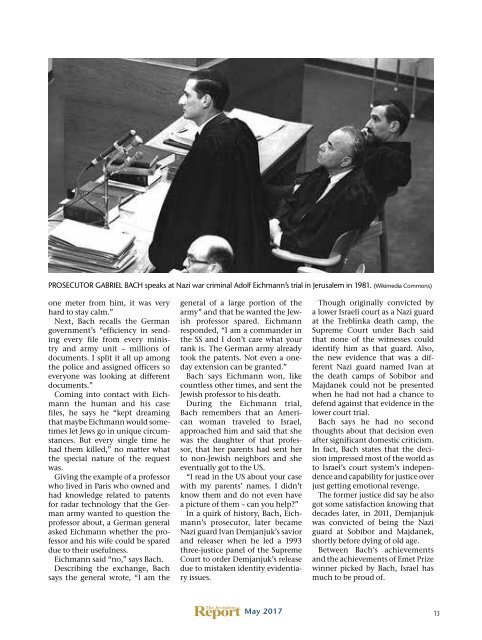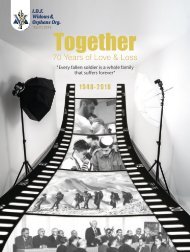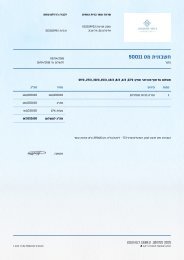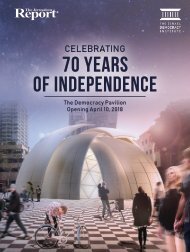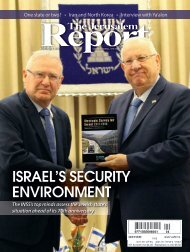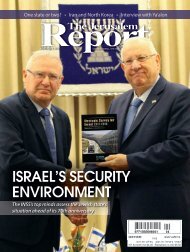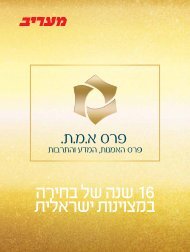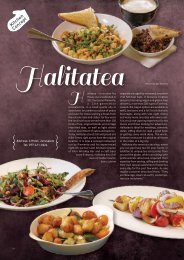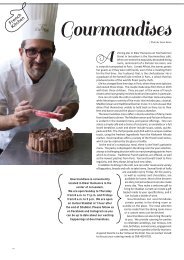Create successful ePaper yourself
Turn your PDF publications into a flip-book with our unique Google optimized e-Paper software.
PROSECUTOR GABRIEL BACH speaks at Nazi war criminal Adolf Eichmann’s trial in Jerusalem in 1981. (Wikimedia Commons)<br />
one meter from him, it was very<br />
hard to stay calm.”<br />
Next, Bach recalls the German<br />
government’s “efficiency in sending<br />
every file from every ministry<br />
and army unit – millions of<br />
documents. I split it all up among<br />
the police and assigned officers so<br />
everyone was looking at different<br />
documents.”<br />
Coming into contact with Eichmann<br />
the human and his case<br />
files, he says he “kept dreaming<br />
that maybe Eichmann would sometimes<br />
let Jews go in unique circumstances.<br />
But every single time he<br />
had them killed,” no matter what<br />
the special nature of the request<br />
was.<br />
Giving the example of a professor<br />
who lived in Paris who owned and<br />
had knowledge related to patents<br />
for radar technology that the German<br />
army wanted to question the<br />
professor about, a German general<br />
asked Eichmann whether the professor<br />
and his wife could be spared<br />
due to their usefulness.<br />
Eichmann said “no,” says Bach.<br />
Describing the exchange, Bach<br />
says the general wrote, “I am the<br />
general of a large portion of the<br />
army” and that he wanted the Jewish<br />
professor spared. Eichmann<br />
responded, “I am a commander in<br />
the SS and I don’t care what your<br />
rank is. The German army already<br />
took the patents. Not even a oneday<br />
extension can be granted.”<br />
Bach says Eichmann won, like<br />
countless other times, and sent the<br />
Jewish professor to his death.<br />
During the Eichmann trial,<br />
Bach remembers that an American<br />
woman traveled to Israel,<br />
approached him and said that she<br />
was the daughter of that professor,<br />
that her parents had sent her<br />
to non-Jewish neighbors and she<br />
eventually got to the US.<br />
“I read in the US about your case<br />
with my parents’ names. I didn’t<br />
know them and do not even have<br />
a picture of them – can you help?”<br />
In a quirk of history, Bach, Eichmann’s<br />
prosecutor, later became<br />
Nazi guard Ivan Demjanjuk’s savior<br />
and releaser when he led a 1993<br />
three-justice panel of the Supreme<br />
Court to order Demjanjuk’s release<br />
due to mistaken identity evidentiary<br />
issues.<br />
Though originally convicted by<br />
a lower Israeli court as a Nazi guard<br />
at the Treblinka death camp, the<br />
Supreme Court under Bach said<br />
that none of the witnesses could<br />
identify him as that guard. Also,<br />
the new evidence that was a different<br />
Nazi guard named Ivan at<br />
the death camps of Sobibor and<br />
Majdanek could not be presented<br />
when he had not had a chance to<br />
defend against that evidence in the<br />
lower court trial.<br />
Bach says he had no second<br />
thoughts about that decision even<br />
after significant domestic criticism.<br />
In fact, Bach states that the decision<br />
impressed most of the world as<br />
to Israel’s court system’s independence<br />
and capability for justice over<br />
just getting emotional revenge.<br />
The former justice did say he also<br />
got some satisfaction knowing that<br />
decades later, in 2011, Demjanjuk<br />
was convicted of being the Nazi<br />
guard at Sobibor and Majdanek,<br />
shortly before dying of old age.<br />
Between Bach’s achievements<br />
and the achievements of Emet Prize<br />
winner picked by Bach, Israel has<br />
much to be proud of.<br />
The Jerusalem<br />
Report<br />
May <strong>2017</strong><br />
13


